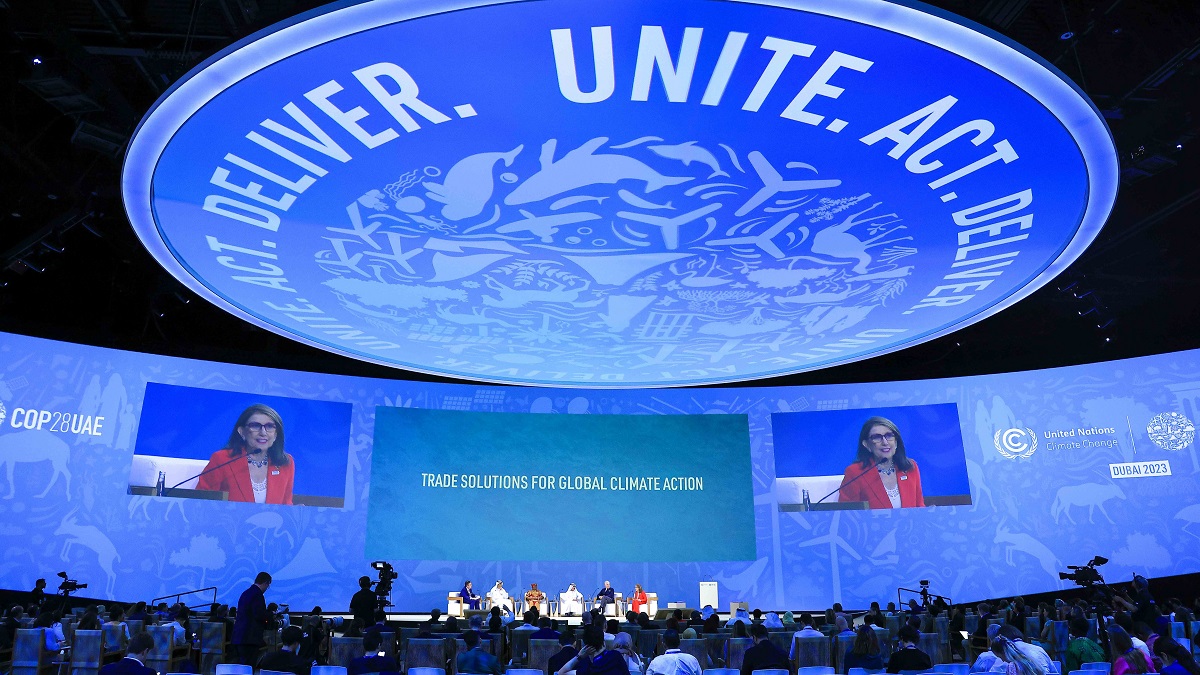Global leaders at the UN climate summit outline a roadmap of trade policy options for a just and ambitious response to climate change.

© UNCTAD | UNCTAD Secretary-General Rebeca Grypnspan speaks on 4 December at the opening of COP28's Trade Day in Dubai, United Arab Emirates.
Trade can be a powerful tool in the fight against climate change, global leaders said on 4 December as they launched “Trade Day” at the COP28 climate summit in Dubai, United Arab Emirates.
This was the first time the UN's annual climate conference dedicated an entire day to trade, highlighting the growing recognition of the need to put trade front and center in climate action.
The global production and distribution of goods and services contribute to roughly a quarter of all carbon dioxide emissions. Trade also plays a key role in tackling climate change by increasing the flow of green goods and services and making it easier for countries to access the technologies and knowledge needed in the low-carbon energy transition.
“Climate and trade policies need to work together,” UNCTAD Secretary-General Rebeca Grynspan said. “As the world is coping with the devastating effects of global warming, it’s time for trade to play its role in shaping climate action that fosters inclusive and sustainable development.”
At Trade Day’s opening, Ms. Grynspan joined global leaders to outline a roadmap of trade policy options for a just and ambitious response to climate change. Watch the launch event.
Throughout the day, governments, businesses and international organizations discussed how to use trade policy to decarbonize global supply chains, incentivize businesses to invest in a net-zero future, secure value chains related to the energy transition and incorporate environmentally responsible practices into trade finance.
Avoid ‘spaghetti bowl’ of regulations
At the opening event, Ms. Grynspan underlined the need for a multilateral approach to avoid a “spaghetti bowl” of climate and environment regulations that small businesses and vulnerable countries cannot navigate.
She also stressed the importance of ensuring the low-carbon transition offers opportunities for mineral-rich developing countries to diversify their economies, reduce their reliance on commodities exports and add more value to what they trade.
“We don't want commodity dependence on the critical materials that are so important for the energy transition,” Ms. Grynspan said.
Leverage trade in critical minerals
Ahead of Trade Day, UNCTAD published a report on trade flows of critical minerals in global value chains for electric vehicle (EV) batteries.
Demand for these minerals is expected to surge – for example, an increase of 454% for lithium and 115% for cobalt from 2022 to 2030 in a net-zero emissions scenario. Many developing countries, especially in Africa, which boasts 19% of global mineral reserves needed for EVs, stand to benefit from the green boom if they can process the minerals locally.
The report shows the significant value added at each stage of processing EV batteries and the opportunities this offers mineral-rich developing countries. It also highlights the market concentration at various parts of the supply chains and the associated risks of disruptions, price volatility and geopolitical tensions.
It points out, for example, that no country from Africa or Latin America is a major participant in the trade of manufacturing cathodes or battery materials.
For developing countries historically reliant on raw material exports, adding value locally is vital for economic resilience. Moreover, enhancing their processing capabilities can help diversify global supply sources.
A trade pavilion to spark solutions
UNCTAD contributed to Trade Day in partnership with the World Trade Organization, the International Chamber of Commerce (ICC), the World Economic Forum (WEF) and the Abu Dhabi Department of Economic Development.
UNCTAD, the ICC, ITC and the WTO are also jointly hosting from 1 to 12 December COP28’s Trade House pavilion, a dedicated space to spark discussions and solutions on how trade can accelerate climate action.


